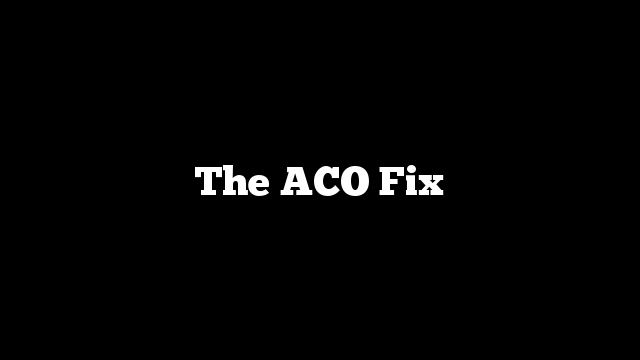Kip Sullivan posted an op-ed in “The Health Care Blog,” “On the Ethics of Accountable Care Research,” on August 25, 2017.
Mr. Sullivan’s questioning the ethicality of health system generated research papers touting statistically insignificant results as triumphs, while perfectly valid and well-reasoned, is like questioning the validity of a teacher’s grading curve while missing that the class is gaming the system.
A system ginned up in the only policy factory in the country with policy-makers naïve enough to actually believe that hospital systems would actually cannibalize their core business to split the results with CMS, then split a legally mandated two thirds with the doctors, then pay its costs out of the rest, would ever work. Commercial payers do it, too, but for far more practical reasons.
The Accountable Care initiative, far more vulnerable than Obamacare, is being circled as easy prey for elimination by D.C. policy lions and pundits. It is undeserving of this fate for one, single, compelling reason. The program theory is valid and, with the right partners, is thriving as a win-win.
Its advantaged design partnership to exactly the wrong partners is the ill-conceived – and failing – part.
Who are the right partners? Independent physicians, for example. The ones that are focused on providing better value for their patients and are incentivized because the new money in healthcare is in delivering value. The broad delta between a bloated, wasteful, ineffective system and the improved one you create can restore fiscal stability to primary care physicians, who are on the verge of being price-cut out of business. Primary care physicians are the key because they can be very effective, and less costly, clinical managers for a patient’s overall care.
Physician ACOs’, however, are destined to be small and relatively inconsequential because hospital systems have been buying up their potential participants for years. After 45 years in healthcare, mostly hospitals, I know that one quite well. If you’re four times the cost of the competition and can’t control the prescription pad, own the pen to own the market.
So as not to be misunderstood, hospitals have their place. They are essential community assets, and, you need big institutions to do big things.
Prevailing upon them to cannibalize their customer base and revenue stream, risking their long-term survivability on some “do your fair share” ideology, however, clashes with reality so starkly that it begs rationalizing survival in the public interest and acting exactly as hospital leaders have.
Let’s be real. Looking for savings from the people who are responsible for managing health crisis is exactly the wrong place to look.
Looking for savings from the people who are responsible for managing patients’ health is exactly the right place.
That’s why non-hospital affiliated, physician governed, professionally managed ACOs’ consistently and substantially outperform hospitals by managing utilization and site of service based on value and having and taking long term responsibility for their patients. Physicians understand that improving health status – keeping people healthy by preventing and managing chronic disease by slowing, stopping or reversing its progression – is the only way to succeed long term.
That is the fundamental problem not only with the ACO system, but, with the entire governmental concept of healthcare. Healthcare is not paying for services. It is providing them.
In a truly American tradition – put providing that care in the right hands by equipping, enabling and empowering their healthcare representatives – physicians. They are not going to spin and sell. They are just going to get the job done.
The mechanism to do so is both simple and fair. Disqualify ACOs’ that chronically have not or cannot generate statistically meaningful savings in areas that they can and should control to make room for a proven entity to fill the void.
The rest will take care of itself.
James Doulgeris is the CEO of Osler Health
